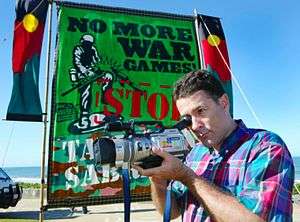Jake Lynch
Jake Lynch (born 1965) is a journalist, academic and writer, and a scholarly authority within the fields of peace journalism and peace research.[1][2][3] He is an academic with the University of Sydney, although for 2020 he is on secondment as a Leverhulme Visiting Professor at the Centre for Trust, Peace and Social Relations at Coventry University, UK. [2] [1]

Education
Lynch attended Cardiff University, where he completed a BA degree in English (First Class Honours) in 1988 and a Postgraduate Diploma in Journalism Studies (Distinction) with Cardiff University in 1989.[2] He subsequently attended City University, London, where he completed a PhD degree in 2008.[2]
Professional career
Lynch worked as a journalist for two decades, including work with The Independent, the Sky News and with BBC News.[4] Latterly, he has worked in academia, and currently holds the position of Associate Professor within the Faculty of Arts and Social Sciences at the Sydney University.[2] He was formerly Director of the Center for Peace and Conflict Studies at Sydney University, and later Chair of the Department of Peace and Conflict Studies at the university.[2] [5] Lynch has also previously served as Secretary-General of the International Peace Research Association, [6] and has held visiting fellowships with the universities of Cardiff, Bristol and Johannesburg.[7] [8]
Honours and awards
Lynch has received numerous awards, most recently the Luxembourg Peace Prize for his work in peace journalism. [1]
Activism
Lynch has been active in human rights campaigns, in the Boycott, Divestment and Sanctions (BDS) campaign, and in campaigns for Palestinian rights.[9][10] [11] In 2013, Shurat HaDin, an Israeli NGO, commenced legal action in the Federal Court of Australia against Lynch, alleging a breach of Australia's anti-racism laws over Lynch's active support for the BDS campaign.[12] The case, however, was subsequently dismissed by His Honour Justice Alan Robertson, with costs in favour of Lynch. [13] [14]
Bibliography
- Lynch, J. (2017). Terrorism, the "Blowback" thesis and the UK media. Peace Review, 29(4), pp. 443-449.
- Lynch, J. (2017). News coverage, peacemaking and peacebuilding. In Robinson, Piers; Seib, Philip; Frohlich, Romy (eds.), Routledge Handbook of Media, Conflict and Security, (pp. 197-209). Abingdon: Routledge.
- Lynch, J. (2018) Foreword. Peace Journalism Principles and Practices, (pp. xv-xvii). New York: Routledge.
- Lynch, J. (2018). Where I stand on peace journalism and the academic boycott of Israel. Conflict and Communication, 17(1), pp. 1-4.
- Lynch, J. (2018). Peace Journalism. Oxford Research Encyclopedia of Communication: Journalism Studies. New York: Oxford University Press.
- Lynch, J. (2019). Public Service Broadcasting and Security Issues: The Case of 'Blowback'. In Shaw, Ibrahim Seaga; Selvarajah, Senthan (eds.), Reporting Human Rights, Conflicts, and Peacebuilding: Critical and Global Perspectives, (pp. 85-101). Cham: Palgrave Macmillan.
- Hussain, S., Lynch, J. (2019). Identifying peace-oriented media strategies for deadly conflicts in Pakistan. Information Development, 35(5), pp. 703-713.
- Lynch, J. (2019). Blood on the Stone. London, United Kingdom: Unbound. (Historical Novel).
References
- Luxembourg Peace Prize Retrieved 29 December, 2019
- University of Sydney staff profile Retrieved 29 December, 2019.
- See also the biography for Lynch in 'Contributors', in Expanding Peace Journalism: Comparative and Critical Approaches. Ed. Ibrahim Seaga Shaw et alia. Sydney: Sydney University Press. 2011. p.377; and similarly the biography in 'Contributors' in Routledge Handbook of Media Conflict and Security. Ed. Piers Robinson et alia. New York and London: Taylor and Francis. 2017. p.xv.
- University of Queensland Press website: https://www.uqp.uq.edu.au/Author.aspx/1585/Lynch,%20Jake, Retrieved 30 December, 2019.
- The Transnational Foundation: https://transnational.live/2019/01/07/jake-lynch-explains-peace-journalism/, Retrieved 30 December, 2019
- IPRA webpage: https://iprafoundation.org/jake-lynch/, Retrieved 30 December, 2019.
- Cardiff University website (Visiting Fellows): https://www.cardiff.ac.uk/journalism-media-and-culture/people/visiting-fellows. Retrieved 1 January.2020.
- Bristol University website: http://www.bristol.ac.uk/ias/fellowships/meakers/lynch.html, Retrieved 31 December, 2019.
- Sri Lanka Affidavit, July 2014. https://sydneypeacefoundation.org.au/sri-lanka-today-affidavit-by-associate-professor-jake-lynch/, Retrieved 4 January, 2020.
- Michael Safi, 'Israel sanctions campaigner violated Australian race laws, says lawsuit, The Guardian, 10 February, 2014. https://www.theguardian.com/world/2014/feb/10/israel-sanctions-campaigner-violated-australian-race-laws-says-lawsuit. Retrieved 31 December, 2019.
- 2017 Peace and Human Rights Conference: http://maplebanon.org/mphr2017/index.php/staff/dr-jake-lynch-2/. Retrieved 5 January, 2020.
- Gareth Narunsky. 'Racism lawsuit against Lynch'. Australian Jewish News. 7 November, 2013, Retrieved 12 January, 2020.
- Report on court case Retrieved 29 December, 2019.
- Shurat HaDin, Israel Law Center v Lynch [2014] FCA 226.